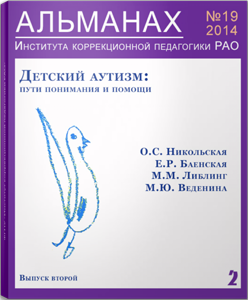Infantile Autism: the Ways of Understanding and Assistance
Almanac #19 · Issue #2 · 2014

Study of the Problem of the Infantile Autism in Russia
The history of clinical and psycho-pedagogical research on autism in this country during the last 45 years is analysed in the article. There are defined the stage of development of this theme mainly in the psychiatric area and the stage of medical-psycho-pedagogical study of autistic development at Research Institute of Defectology since the 70-s. There is briefly stated the model of autistic development as a profound pervasive disorder connected with an activity disorder and lowering of threshold of affective discomfort in the contacts of the autistic child with the environment.
Keywords
Study of the Problem of the Infantile Autism in Russia
infantile autismprofound pervasive disorder
autistic development
model of autistic development
medical-psycho-pedagogical study
The survey of the main foreign approaches to providing psychological-pedagogical assistance for the children with autism
The articles gives an idea of the modern approaches to the autism correction abroad. The each of the presented in the article The each of presented in the article tendencies is based on its theoretical position and has its own view of the disorder and its causes. Within the described ways of assistance despite the difference in the theoretical base there is defined the closest to our approach DIR-model (the Floor-time method).
Keywords
The survey of the main foreign approaches to providing psychological-pedagogical assistance for the children with autism
modern approaches to the autism correctionways of assistance
DIR-model
Floor-time method
Psychological correction of childhood autism as an affective disorder: the essence of the approach
,
The article concerns the essentials of an approach to Autistic Spectrum Disorders (ASD) treatment designed at the Institute of special education. The approach is based on affective development disorder model which is set out in the article. Most important phases of correctional job are described and substantiated such as an adult's joining to a child's activity, joint emotional experiences development, their notional processing and complication. Main goal of the whole treatment is to develop more active and sensible relationships between autistic child and his environment.
Keywords
Psychological correction of childhood autism as an affective disorder: the essence of the approach
Mechanism of normal early emotional development
The article traces the development of normal formation of the affective sphere of the child at the early age, there are analysed his successive achievements in the development of relationship with the environment, in the formation of the individual affective experience. On the analogy and in addition to the conception “the mutual shared activity”, which is accepted in the domestic psychology, there is introduced the concept “the mutual shared anxiety” which defines the source and the motive force of the development of individual affective life of the infant.
Keywords
Mechanism of normal early emotional development
mechanism of normal emotional developmentrelationship with the environment
affective life of the infant
the mutual shared activity
the mutual shared anxiety
The early affective development of children with autism
The article considers the first characteristic features of the developing syndrome of infantile autism, it traces the dynamics of early difficulties of the affective development of the child which distorts the way of psychical ontogenesis, there are distinguished their combinations typical for different variants of autistic dysontogenesis . There are traced relations between the vivid manifestations of the of the autism syndrome with the primary deficiency of the early forms of affective interaction of a child with the family. There is defined the main tendency and content of the special support.
Keywords
The early affective development of children with autism
autistic dysontogenesisspecial support
autism syndrome
forms of affective interaction of a child
infantile autism
Playing holding therapy for autism: methodological features and ethical aspects of application
The article tells about the playing holding therapy – a modification of the well-known foreign method. There is presented an experience of playing holding therapy application in the sphere of special assistance for the children with autism and their families. There is described an investigation of psychological mechanism of this method which shows, that in the process of the playing holding therapy the affection of a child towards his mother is being formed. It’s qualitatively compared with the affection of an early age child towards the mother in normal ontogenesis. There are specified methodological recommendations and ethic aspects of the therapy are discussed.
Keywords
Playing holding therapy for autism: methodological features and ethical aspects of application
playing holding therapychildren with autism
affection of a child towards his mother
special assistance
psychological mechanism